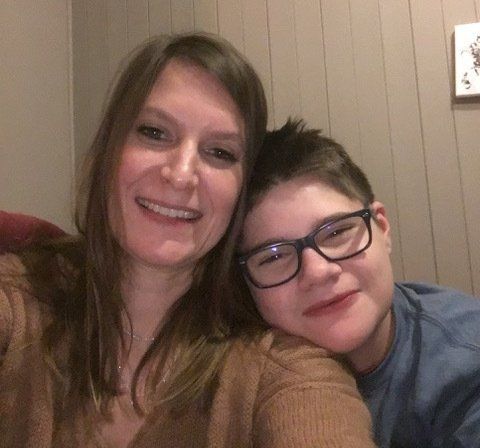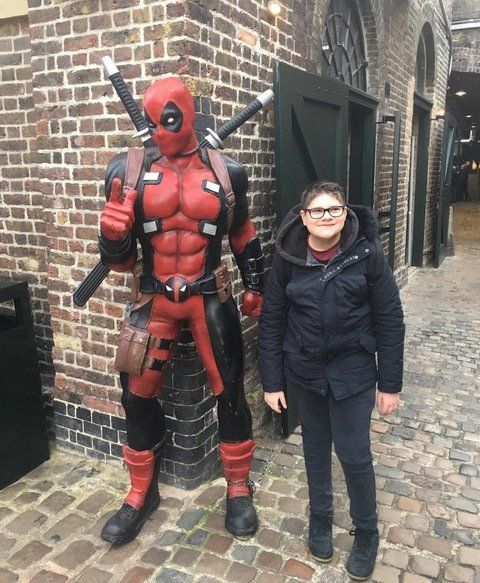A Piece of a Life’s Journey

His first pediatrician did not see his difference. He told us boys develop later than girls. After Arthur had stomach’s surgery when he was 15 months old, we went to another pediatrician. From the beginning, his new pediatrician realized that there was a problem at the genetic level, considering all the symptoms Arthur experienced during his growth: small head circumference, dyspraxia, suspicion of TAD, suspicion of Autism, developmental issues, speech issues and motility issues. At the same time, when the pain was less intense, Arthur was always a happy and smiling baby. Now that he is a teenager, he has kept his “joie de vivre” and has a lot of humor despite his difficulties.
The Genetics Department has carried out various genetic tests throughout Arthur’s growth with the expectation of results but it was always negative including genetic testing for fragile X. During all these years I searched for reasons to understand why my child had all these difficulties, these sufferings and these uncertainties. I decided to put my professional life aside. I resigned from my job and dedicated myself to my children. To accompany Arthur to therapies, I worked part-time jobs. I had to push down doors and fight for help (few parents in France accompany their children with disabilities and with professional care givers, and usually children are put in institutions).
I built a team of professionals around Arthur to work with him to improve his abilities and relieve him in his suffering. This high-performance team has evolved over the years following the needs of Arthur (physiotherapist, psychomotor therapist, speech therapist, occupational therapist, orthopedist, osteopath, psychologist). This team is passionate about their profession and their clients. Their kindness and compassion has enabled me to reflect and think about the best ways to help Arthur with his difficulties while at making sure he was happy. The team I assembled has impacted our family life. I have always tried to give special moments to our daughter. Fortunately, my family and friends have had and still have an important role on this team.
A few years ago I decided to resume my studies and obtain social work skills and degrees. This experience inspired me to help vulnerable people: people with disabilities or parents of different children. My professional mission is assist them in any way to improve their situation including educating them about their rights and assisting them in the process of obtaining those rights.
The Announcement
In 2017, when I received a letter from the Genetics Department of the Hospital informing us that a diagnosis was made, I cried. I was overwhelmed by this news but relieved to have an answer and to know the reasons for all these sufferings, questions and difficulties.
Arthur was present when I read the diagnosis and after he read it he handed it to me he said, “does that mean that I have super powers like super heroes?” He felt relieved to know that his difficulties had an explanation.
After this appointment, I searched the Internet for days about this disease and found a webpage in which Professor Okur wrote, “If you know someone or someone in your family has Okur-Chung Neurodevelopmental Syndrome contact me at this email address.” That same day I sent a message, as if it were a message in a bottle, full of hope. Two weeks later, I received a message. I was so happy. We had many fruitful email exchanges. He told me about the closed Facebook group for OCNDS. I joined the closed Facebook group for like parents and from that moment I was no longer alone. I was part of this community of parents who lived or live the same moments as I do. I could finally share my experience as a mom, my life’s experience.
Recently, I had the pleasure of talking with Jennifer Sills about our experience, being a mom, and about the lives of our beloved children. Jennifer is a wonderful mom who goes to meet OCNDS parents and individuals with OCNDS. She gives her time and kindness. We had a strong encounter of emotions despite the kilometers between us.
Thank you! Looking forward to meeting you all!
Arthur’s mom

Dès sa naissance j’ai senti qu’Arthur était en souffrance et qu’il y avait quelque chose qui n’allait pas. Nous avions déjà une petite fille de deux ans à son arrivée.
Mon bébé était en souffrance, il pleurait beaucoup et dormait très peu. Il était difficile de l’apaiser.
La fatigue, l’épuisement, la peur de le perdre, ces sentiments ont fait partie de ma vie depuis sa naissance.
Son premier Pédiatre n’a pas vu sa différence, il nous avait dit les garçons sont plus en retard que les filles. Après l’opération de l’estomac d’Arthur à 15 mois, nous avons changé de Pédiatre.
Dès le début le Pédiatre actuel a su qu’il y avait un problème au niveau génétique avec tous les symptômes d’Arthur au fur et à mesure de sa croissance : petit périmètre crânien, dyspraxie, suspicion TAD, suspicion Autisme, problème de développement, problème de langage, problème de motricité…
En même temps, lorsque la douleur était moins intense, Arthur a toujours été un bébé joyeux et très souriant, maintenant qu’il est adolescent, il a gardé sa joie de vivre et a beaucoup d’humour malgré ses difficultés.
Le Service de Génétique a procédé à divers tests génétiques tout au long de la croissance d’Arthur avec l’attente des résultats mais toujours négatifs : X fragile,…
Pendant toutes ces années j’ai cherché les raisons pour lesquelles mon enfant avait toutes ces difficultés, ces souffrances, ces incertitudes…
J’ai décidé de mettre ma vie professionnelle entre parenthèses de démissionner de mon travail et de me consacrer à mes enfants.
Pour accompagner au mieux Arthur, j’ai pris des emplois à mi-temps, j’ai dû pousser des portes et lutter pour obtenir des aides (peu de parents en France accompagnent leurs enfants en situation de handicap avec des professionnels en libérale, généralement les enfants sont placés en institutions).
Ainsi j’ai constitué une équipe de professionnels autour d’Arthur pour l’accompagner afin d’améliorer ses capacités et le soulager dans ses souffrances.
Cette équipe très performante à évoluée au fur et à mesure des années suivant les besoins d’Arthur (kinésithérapeute, psychomotricien, orthophoniste, ergothérapeute, orthoptiste, ostéopathe, , psychologue…)
Des personnes passionnées par leur métier travaillant dans la bienveillance qui m’ont permis aussi d’avoir des échanges, des réflexions pour trouver les meilleurs axes de travail pour permettre à Arthur d’évoluer au mieux avec ses difficultés et trouver un bien être.
Toute cette organisation a impacté notre vie de famille. J’ai toujours essayé d’accorder des moments particuliers pour notre fille. Et heureusement, ma famille et mes amis ont eus et ont toujours un rôle important dans cet aménagement.
Il y a quelques années j’ai décidé de reprendre mes études pour obtenir les compétences et diplômes de travailleur social. Mon souhait le plus cher était de faire ce métier pour aider des personnes vulnérables, handicapées où des parents d’enfants différents.
Les aider dans les démarches pour obtenir des droits, les accompagner socialement pour améliorer leur situation est devenu pour moi mon chemin professionnel.
L’annonce
Lorsque j’ai reçu le courrier en 2017 du Service de Génétique de l’Hôpital nous informant qu’un diagnostic était posé, j’ai pleuré, j’étais chavirée par cette nouvelle et tellement soulagée d’avoir une réponse et de connaitre les raisons de tous ces souffrances, interrogations, difficultés…
Arthur était présent lors de la restitution du diagnostic, lorsqu’il a tendu il m’a dit « ça veut dire que j’ai des supers pouvoir comme les supers héros ? » <3 <3 <3
Il s’est senti soulagé de savoir que ses difficultés avaient une raison.
Après ce rendez-vous, j’ai cherché sur internet pendant des jours des articles sur cette maladie et j’ai trouvé un message du Professeur OKUR disant : « Si vous connaissez quelqu’un ou qu’une personne de votre famille est atteint du Syndrome neurodéveloppemental OKUR –CHUNG contacté moi à cette adresse mail ».
J’ai envoyé le jour même un message comme une bouteille à la mer, pleine d’espoir.
Deux semaines plus tard j’ai reçu un message de sa part, j’étais tellement heureuse d’avoir reçu son message.
Nous avons échangé et j’ai pu intégrer le groupe parent et à partir de ce moment je n’étais plus seule. Je faisais partie de cette communauté de parents qui ont vécus où vivent les mêmes moments que moi. Je peux enfin transmettre mon expérience de maman, de vie, nous pouvons échanger pour avancer ensemble !!!
Dernièrement j’ai eus le plaisir de parler et d’échanger avec Jennifer Sills sur notre expérience de maman, sur la vie de nos enfants chéris.
Jennifer est une maman formidable qui part à la rencontre des parents qui donne son temps et sa bienveillance.
Une rencontre forte d’émotions malgré les kilomètres.
Merci ! Hâte de tous vous rencontrer !
M aman d’Arthur
